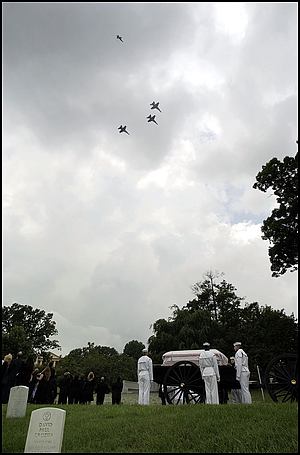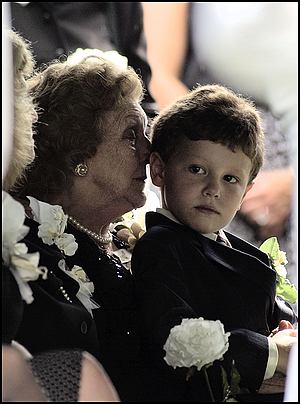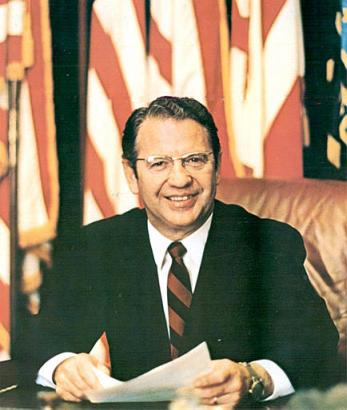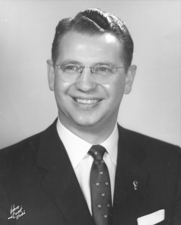Former Senator Hartke buried
By Scripps Howard News Service
September 16, 2003
Military jets perform a missing-man fly-by over the caisson carrying the
casket of former Indiana Senator Vance Hartke, during his funeral services at
Arlington National Cemetery on Monday
Martha Hartke, widow of former Indiana Senator Vance Hartke, holds
her grandson, Dean Hartke, during her husband’s funeral services on Monday
ARLINGTON NATIONAL CEMETERY — In a scenic, hilly corner of Arlington National Cemetery mere steps from where President John F. Kennedy’s eternal flame burns on, friends and family paid their final respects Monday to Vance Hartke, an Indiana Democrat who served in the U.S. Senate from 1958 to 1976.
Hartke, also known as an anti-war candidate for president in 1972, died in July of heart failure. He was 84.
His funeral warranted military honors including a fly-by and a horse-drawn caisson that carried the former senator’s body from the chapel to his final resting place, to the solemn thrum of drums beating.
Steps from his grave, family — including his seven children, 16 grandchildren and wife Martha — paused and watched, teary-eyed, as four military jets flew over, with one separating from the others to fly heavenward.
Later, at the gravesite, Martha, married to Hartke for 60 years, accepted the tightly folded triangle of an American flag minutes after “Taps” and “America the Beautiful” rang solemnly through the cemetery. At the gravesite, some loved ones wore corsages featuring a photo of their father as a U.S. senator. At the service’s conclusion, some family members huddled near the casket, one hand touching it, seeming reluctant to say goodbye.
Hartke, who began his political career as mayor of Evansville, was best known in the Senate for becoming one of the first to speak out against the Vietnam war. His opposition to the war cost him politically, damaging his friendship with then-President Lyndon Johnson. But Hartke was unyielding — he felt the war was immoral and spoke out on it after some soul-searching, according to son Jan.
Courtesy of the United States Senate
HARTKE, Rupert Vance, a Senator from Indiana; born in Stendal, Pike County, Indiana, May 31, 1919; attended the public schools of Stendal; graduated from Evansville College in 1940 and Indiana University Law School in 1948; during the Second World War served in the United States Coast Guard and Navy as a seaman and through the ranks to lieutenant 1942-1946; admitted to the Indiana bar in 1948 and commenced the practice of law in Evansville, Ind.; deputy prosecuting attorney of Vandenburgh County, Ind., 1950-1951; mayor of Evansville, Ind., 1956-1958, when he resigned; elected as a Democrat to the United States Senate in 1958; reelected in 1964 and again in 1970, and served from January 3, 1959, to January 3, 1977; unsuccessful candidate for reelection in 1976; unsuccessful candidate for the Democratic nomination for President of the United States in 1972; chairman, Committee on Veterans’ Affairs (Ninety-second through Ninety-fourth Congresses); was a resident of Falls Church, Virginia, until his death on July 27, 2003.
Former Senator Vance Hartke, a liberal Indiana Democrat whose staunch opposition to the Vietnam War put him at odds with President Lyndon B. Johnson, died Sunday from heart failure. He was 84.
Hartke, who set up a law practice in Falls Church, Virginia, after he was defeated for re-election in 1976, died in a suburban Virginia hospital after being rushed there Saturday with chest pains, said his son, Jan. He had undergone open-heart surgery three years ago.
Hartke was the mayor of Evansville, Indiana, when he was first elected to the Senate in 1958. He was soon befriended by Johnson, the party’s majority leader, who awarded him choice assignments on the powerful Finance and Commerce committees.
After winning re-election to a second term six years later, Hartke used his committee posts to advance Johnson’s Great Society agenda, helping craft legislation creating student loan programs and new veterans benefits.
“In the late 1950s and the 1960s, he was one of the strongest voices for Medicare,” retired Rep. Lee Hamilton, D-Ind., recalled Monday. “He took a real lead on that (despite) a lot of opposition in the state of Indiana. He was not afraid to take a tough, controversial stand.”
Hartke used his chairmanship of Commerce’s transportation subcommittee to make automakers equip cars with seat belts and other safety equipment, and helped establish Amtrak and Conrail. He also was instrumental in creating the International Executive Service Corps, an organization, modeled after the Peace Corps, that sent retired U.S. businessmen to poor countries to help turn small businesses into large ones.
The split between Hartke and Johnson occurred in 1965, when Hartke aligned himself with other Senate Democrats opposed to the Vietnam war. The group included J. William Fulbright of Arkansas, Eugene McCarthy of Minnesota and George McGovern of South Dakota.
Hartke’s opposition to Vietnam later earned him a spot on Richard Nixon’s enemies list, but Hartke refused to hold a grudge against Nixon.
“That’s neither here nor there,” Hartke told The Indianapolis Star in 1991. “That’s in the past.”
Hartke won a third term in 1970 after a recount, a narrow victory marred by his Vietnam stance. He lost his Senate seat in 1976 to Republican Richard Lugar.
Hamilton said Hartke had an encyclopedic memory of projects in every Indiana county and recalled putting in 15- and 18-hour days campaigning with him.
“He revitalized Democratic politics in the state of Indiana,” Hamilton said. “He brought tremendous energy to it. He was a genuine populist. His great passion was for ordinary Americans.”
Lugar said he last saw Hartke in July.
“He was vigorous, enthusiastic and optimistic as always,” Lugar said in a statement. “I counted upon him as a friend with strong Hoosier ties and a generous spirit that gave me a boost each time I visited with him.”
“You wished you had all the energy he had,” said Indiana Gov. Frank O’Bannon. “At 84 he was still going strong.”
Sen. Evan Bayh, D-Ind., who was attending a Democratic Leadership Council meeting Monday in Philadelphia, said Hartke “served the people of Indiana with distinction as both mayor and U.S. senator.”
Hartke also had his share of political problems. In 1994, he was indicted by a grand jury in Indiana for alleged misdemeanor polling violations in connection with a successful campaign to allow riverboat casinos in Dearborn County. As part of a plea agreement, he was given a six-month suspended sentence.
Hartke was born May 31, 1919, in the southern Indiana coal-mining town of Stendal. After graduating from the University of Evansville, he earned his law degree from Indiana University. He enlisted in the Coast Guard and later served as a Navy officer in World War II.
“He was working in his office Friday night when I dropped by to see him,” said his son Jan. “He wanted to be somebody who continued to achieve something.”
Hartke is survived by his wife of 60 years, Martha, four sons, three daughters and 16 grandchildren, all of whom were with him when he died. He will be buried at Arlington National Cemetery but funeral plans were incomplete Monday, his family said.
Sen. Vance Hartke, 84, Dies; Early Foe of War in Vietnam
July 29, 2003
Former senator Vance Hartke (D-Indiana), who supported President Lyndon B. Johnson’s Great Society programs but broke with him over the Vietnam War, died July 27, 2003, at Inova Fairfax Hospital. He was 84.
The three-term senator, who had remained in the Washington area to practice law after losing his 1976 bid for reelection, died of a heart ailment.
Sen. Hartke’s opposition came in the mid-1960s, relatively early in the course of the escalation of the U.S. commitment in Vietnam.
His son, Jan, recalled yesterday how he sat at the time with his father and his mother, Martha Hartke, in the family kitchen in Falls Church as his father spoke about his feelings and his decision.
“It was a major discussion, for hours,” Jan Hartke said. “I remember he just said, ‘Look, I think this war is morally wrong, and it’s going to destroy everything we are trying to do in the Great Society.
” ‘And I’m going to oppose it.’ ”
On May 15, 1966, more than two years before the fissures in American society caused by the war were dramatized at the Democratic National Convention in Chicago, a peace demonstration was held in Washington.
The protesters, said to number 8,000 to 11,000, carried signs with quotations from prominent senators. One was from Senator Hartke.
“Escalation breeds escalation,” it read.
Earlier that year, on Jan. 27, a letter had been presented to Johnson calling for a suspension of the bombing of North Vietnam. Senator Hartke was one of six senators who drafted it.
In March 1966, syndicated columnists Rowland Evans and Robert Novak quoted an unnamed “liberal Senator” as saying, “The peace group has no leader but what leadership we get comes from Hartke.”
For Sen. Hartke, opposing the president had been difficult, his son said. He had been “a huge friend of Johnson at the time . . . enormously close.”
An account of a 1998 interview with the senator, published in the Mishawaka (Indiana) Tribune, said Johnson retaliated in a variety of ways, at one point calling Senator Hartke a “two-bit mayor from a two-bit town.”
Senator Hartke had once been mayor of Evansville.
He told the Indiana newspaper that he had responded, “Well, maybe I’m a two-bit mayor, but I’ll tell you one thing: Evansville never was a two-bit town.”
Jan Hartke said that before Johnson died, the former president sent a letter of reconciliation to Sen. Hartke, noting not only the times the two men had “fought with each other,” but also that “they had fought many great battles together.”
Beyond his antiwar stance, Sen. Hartke was credited with important roles in the passage of measures that created or supported student loan programs, veterans’ benefits, Medicare, Head Start and rail transportation systems.
He also helped spearhead the automobile safety movement on Capitol Hill and developed an organization modeled on the Peace Corps that helped small overseas businesses.
He also was praised for winning passage of a measure making kidney dialysis more widely available. A statement entered into the Congressional Record in honor of his 80th birthday four years ago credited the measure with saving 500,000 lives.
Rupert Vance Hartke was born in the Indiana town of Stendal on May 31, 1919, and graduated in 1940 from Evansville College.
During World War II, he served in the Coast Guard and Navy, entering as a seaman and rising to the rank of Lieutenant.
Afterward, in 1948, he graduated from Indiana University’s law school and began practicing in Evansville.
After becoming that city’s mayor, Sen. Hartke integrated Evansville’s swimming pools. His two-year tenure began in 1956, not long after the Supreme Court ruled that public school segregation was unlawful.
The city was in the southern part of the state, and “we had people calling the house with all the hate stuff,” the senator’s son said.
However, Jan Hartke said, the action was in accord with his father’s belief that “government could do great good for people.”
Sen. Hartke had seven children, 16 grandchildren, and one great-grandson, and another of his core beliefs was in the importance of keeping his family together, Jan Hartke said. Once he attended four of the children’s basketball games in 24 hours.
The firm in which he practiced after being defeated by Republican Richard G. Lugar is called Hartke & Hartke, and several of his children practiced or worked in it with him.
He was the author of several books, including “The American Crisis in Vietnam” (1968) and “You and Your Senator” (1970).
He had been chairman of the Senate Committee on Veterans’ Affairs and made a short-lived attempt to win the Democratic presidential nomination in 1972 as an antiwar candidate.
In addition to his wife and son Jan, survivors include six other children, Sandra, Wayne, Keith, Paul, Anita and Nadine.
July 29, 2003
Vance Hartke, Antiwar Senator of Indiana, Dies at 84
Vance Hartke, a three-term Democratic senator from Indiana best known for his criticism of the American involvement in the wars in Southeast Asia, died on Sunday in Fairfax, Virginia. He was 84 and lived in Falls Church, Virginia.
The apparent cause was a heart attack, said his family, who said he had been working at his law office the day before.
Mr. Hartke, a former mayor of Evansville, arrived on Capitol Hill in 1958, the first Democrat in 20 years to win a Senate seat from Indiana. Backed by organized labor, he won after campaigning for more jobs, civil rights and action on flood controls.
A liberal, he entered a Senate still heavily influenced by conservative Southern Democrats. He served on the Interstate and Foreign Commerce Committee and the Finance Committee and in the 1970’s he led the Senate Committee on Veterans’ Affairs.
Mr. Hartke lent strong support to the agenda of the Kennedy and Johnson administrations. He was a mainstay in the legislative fights for landmark social programs like Medicare and Medicaid, as well as the 1964 Civil Rights Act and the Voting Rights Act of 1965.
He developed a personal rapport with President Lyndon B. Johnson but broke with him over Vietnam as early as 1965, before the American troop buildup and war casualties on both sides reached their peaks.
In 1972, he unsuccessfully entered the New Hampshire primary for the Democratic presidential nomination. His central theme was total and unconditional American withdrawal from Indochina.
He had more success as a sponsor of the International Executive Service Corps, a volunteer body patterned after the Peace Corps. He also helped lay the foundations for the United States Institute of Peace, a nonpartisan institution set up by Congress in 1984, and the Inter-American Development Bank.
Mr. Hartke had a reputation as a lucky candidate, having first been elected in a Democratic landslide year when Republicans were beaten across the country. He was re-elected in the Johnson landslide of 1964. The next time around, in 1970, his margin over a conservative Republican was a mere 6,400 votes.
In 1976, his luck ran out. He squeaked by in the Democratic primary after a nasty battle with a freshman representative, Philip H. Hayes. That bruising contest depleted his resources but left plenty of ammunition for his well-financed Republican challenger in the November election.
Mr. Hartke lost to Richard G. Lugar, the former mayor of Indianapolis who is now chairman of the Senate Foreign Relations Committee. Mr. Hartke left the Senate in January 1977.
Rupert Vance Hartke was born in Stendal, a mining town in Pike County. He was active in school sports and president of the student government at Evansville College, where he graduated in 1941. He served in the Coast Guard and the Navy until 1946, rising from seaman to lieutenant, and received a law degree with honors at Indiana University in 1948. He practiced law in Evansville and served as mayor of Evansville from 1956 until his election to the Senate.
After his departure from Capitol Hill, he was a principal in the law firm of Hartke & Hartke in Falls Church and the Hartke Group. He was engaged in general practice law as well as consulting work for American and international agencies and business interests.
He wrote four books, including “The American Crisis in Vietnam” (Bobbs-Marrill, 1968).
Mr. Hartke is survived by his wife of 60 years, Martha Tiernan Hartke; three daughters, Sandra Garcia of Boonsboro, Maryland, Anita R. Hartke of Gainesville, Virginia, and Nadine J. Hartke of Reston, Virginia.; four sons, Jan A. of Reston, Wayne R. of Clifton, Virginia., and Keith L. and Paul V. of Reston; 16 grandchildren, and one great-grandson.
HARTKE, RUPERT VANCE
- LT US NAVY
- CSK US COAST GUARD
- WORLD WAR II, KOREA
- DATE OF BIRTH: 05/31/1919
- DATE OF DEATH: 07/27/2003
- BURIED AT: SECTION 5 SITE 7043-A
ARLINGTON NATIONAL CEMETERY
Michael Robert Patterson was born in Arlington and is the son of a former officer of the US Army. So it was no wonder that sooner or later his interests drew him to American history and especially to American military history. Many of his articles can be found on renowned portals like the New York Times, Washingtonpost or Wikipedia.
Reviewed by: Michael Howard




